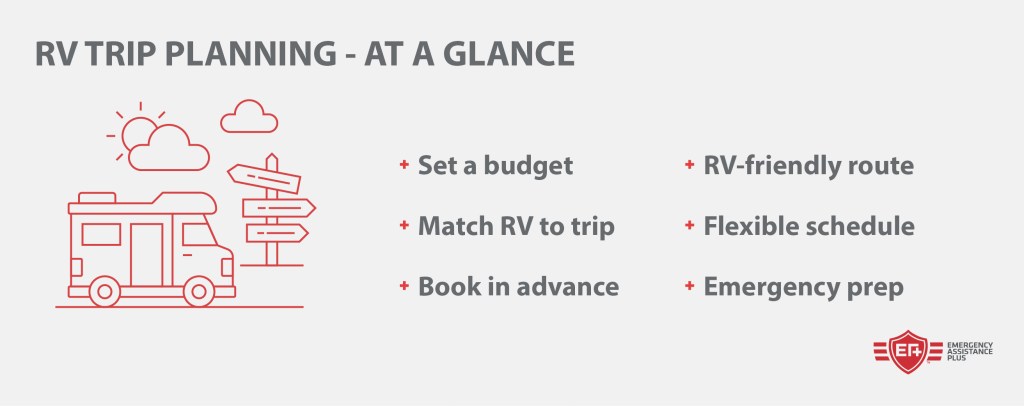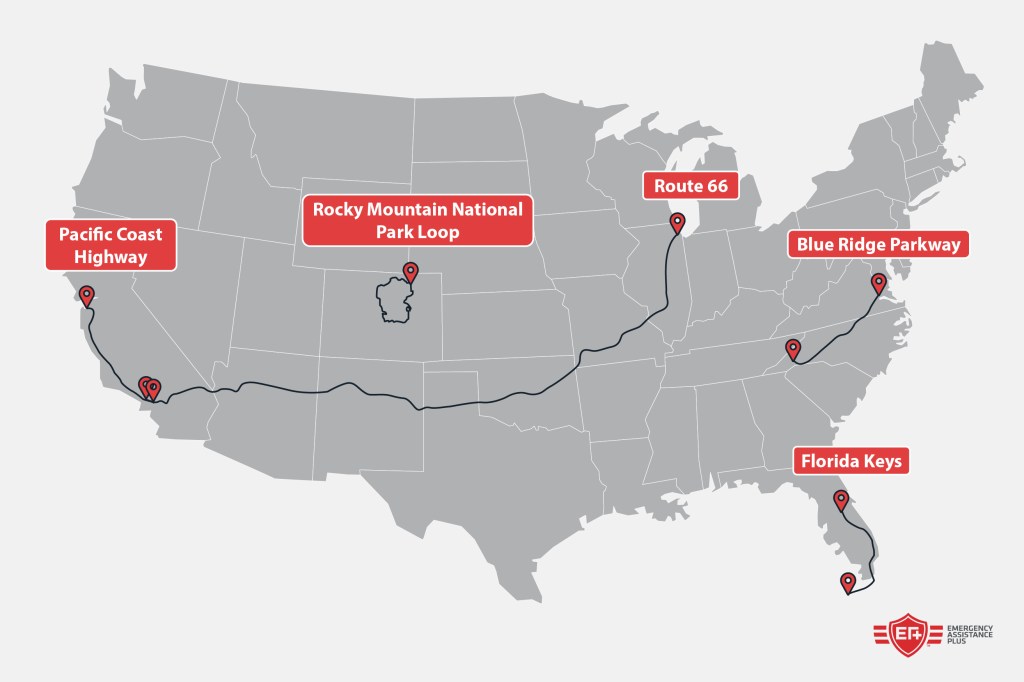Travel Tips
Check out this guide for tips and advice on how to plan an epic RV road trip.
RV road trips offer a unique and enjoyable way to explore the country, connect with loved ones, and create cherished memories that last a lifetime.
Planning an RV road trip can be fun and exciting, but it’s also a lot of work. While you never have to worry about missing a connecting flight, you do have to consider things like fuel consumption, campground reservations, meal planning, and so much more.
In this guide, we’ll break down everything you need to know about planning an epic RV road trip. The information is categorized and broken down into a step-by-step guide so you can be sure you won’t miss any details that might interrupt your trip.
Let’s get into the details of how to set yourself up for success for your next adventure!
Follow these steps to ensure you don’t overlook anything while planning your trip.
Everything you plan should be based on a budget you establish. From a banker’s perspective, a vacation is a sunk cost, meaning you’re never going to get a monetary return from the money you spend. Therefore, pick a number you’re comfortable parting with.
Once you have your number you can start itemizing your costs. The three biggest expenses on an RV trip are:
For fuel, simply estimate the total mileage of your trip and divide that by the average miles per gallon for your RV. Add 20% to this number as a cushion and you have your fuel budget.
For food, start thinking about your trip duration and use your standard weekly grocery budget as a baseline. You’ll likely eat out three to five meals per week, so factor that in as well.
Lastly, you’ll need to plan for campground fees, which can vary significantly depending on where you stay. According to Camper Report, basic RV campgrounds and state parks will run you $25-$45 per night, while luxury resorts are close to $60-$100 per night.
These numbers don’t need to be exact down to the penny—the point is to see how much the essentials eat into your budget. Once you subtract the essentials, you’ll have a much better idea of how much money you have left over to cover excursions and other experiences. This is helpful in figuring out where you can afford to go and what type of trip you can plan.
Next you’ll want to ensure that your RV matches the type of trip you want to take. Consider the following two examples:
For instance, let’s say you’re the owner of a 40-foot Class A motorhome. This vehicle will simply not fit in smaller, more remote campgrounds, so you’ll need to ensure the accommodations you book have ample room.
On the other side of the coin, imagine packing a family of four into a 16-foot Class B van. While that may be survivable for a 3-day weekend, it’s not feasible to plan a 2-week trip with that vehicle.

When possible and practical, try to book accommodations far in advance. This will help you secure availability, and you might be able to find discounts if you book beforehand. Many of the state and national park campsites are booked months in advance—if you’re planning a summer vacation, you’ll want to start making reservations by the start of the year.
Note: When booking ahead of time, be sure to read the campsite details carefully, including the cancellation policy.
Experienced RVers know that driving is much different in an RV than a car. You have to plan more carefully in order to avoid routes that have height clearance issues like bridges and tunnels, rough dirt roads, tight parking lots, and roads that have propane restrictions.
The Roadtrippers app has a feature that can help. After you download the app and enter your destination, you can toggle the “RV Safety” switch and see if your potential route has any issues for your vehicle. You can even input the height of your RV and indicate if you have propane on board or not for a custom recommendation.

Additionally, plan on doing some good-old fashioned research on Google Street View to plan your major gas stops—the bigger the parking lot the better!
Flexibility is one of the key benefits of RV travel—see the next section for a full list of RV travel benefits.
Instead of creating a rigid day-by-day schedule, opt for a loose itinerary. Have a general idea of the places you want to visit and the activities you’d like to do, but avoid overbooking or committing to specific dates and times.
While booking campsites and RV parks in advance can offer peace of mind, try to limit them to a few key locations. This approach allows you to have more flexibility in adjusting your route based on your experiences and preferences.
Additionally, be open to boondocking. Boondocking, also known as dry camping or dispersed camping, refers to camping in undeveloped areas without hookups. Utilizing boondocking sites allows you to be more flexible with your travel plans as you aren’t tied to specific campgrounds or RV parks.
Staying flexible is a great start; however, it’s important to prepare ourselves for the unexpected.
Keep your RV stocked with essential supplies like food, water, and other necessities. In addition to the basics, it’s wise to pack traction boards, tow straps, and a remote jumper. These automotive tools will help you in the event of an emergency (Ex. battery dies in a remote location, you get stuck on the beach, etc.) Having what you need onboard allows you to spend more time off-grid and in remote areas without worrying about resupplying frequently.
Also, consider investing in travel assistance. With an annual travel assistance plan from Emergency Assistance Plus, you can road trip in your RV with confidence knowing that you have an experienced travel partner on your team to help with:
For more information about the services EA+ provides, please visit our membership page.
Still unsure if an RV road trip is for you? Here are some of the unique benefits of hitting the road in an RV!
Arguably the greatest benefit of RV travel is the freedom and flexibility it provides. You have the ability to choose your own destinations, routes, and itinerary. You can change your plans on the fly, explore locations outside of cities and towns, and spend as much time as you want in each place.
Compared to tent camping, an RV offers a far more comfortable experience. You have your own living space with amenities such as a bed, kitchen, bathroom, and storage. This means you can pack all your essentials, have control over your environment, and avoid the hassle of constantly packing and unpacking everything you want to use. (tables, cooking and washing stations, etc.)
RV travel combines transportation and accommodation into one package, eliminating the need for costly hotel stays. You have the option to cook your meals in the RV, reducing dining expenses. Additionally, camping fees at RV parks or public campsites are often more affordable than traditional accommodations.
RV trips allow you to connect with nature and enjoy the great outdoors. You can camp in beautiful natural settings, wake up to stunning landscapes, and have access to activities such as hiking, fishing, and wildlife watching. It’s an ideal way to escape the city and immerse yourself in the tranquility of nature while maintaining the creature comforts you want.
RV trips provide an excellent opportunity to spend quality time with family and friends. The close quarters of an RV encourage bonding, shared experiences, and creating lasting memories together. Whether it’s playing games, telling stories around a campfire, helping each other with tasks, or simply enjoying each other’s company, an RV trip can strengthen relationships.
We’ve all been on whirlwind trips—catching flights, checking into hotels, and rushing off to sightseeing reservations. RV travel, on the other hand, promotes a slower pace, allowing you to unwind, relax, and disconnect from the demands of everyday life. You can take breaks whenever you want, enjoy scenic drives, and take in the beauty of your surroundings. It’s an opportunity to escape the rush and savor the actual journey itself.
These are just a few of the many benefits of an RV road trip. You can tailor your trip to your preferences—whether you seek a dirt bike adventure, a tranquil fishing trip, or maybe a mix of both. Either way, RV travel offers the chance to embark on a unique and memorable journey while enjoying the comforts of home on the road.
Ready to hit the road in style?
Don’t forget to make sure your RV trip is protected with travel assistance services from EA+.
These five epic RV road trips offer a range of landscapes, attractions, and unique experiences. Each route has its own charm and adventure, allowing you to explore the diverse beauty of the country at your own pace.

Route 66 is one of the most famous and nostalgic road trips in the United States, stretching from Chicago, Illinois, to Santa Monica, California. This historic highway spans approximately 2,400 miles (3,860 kilometers) and takes you through eight states. Along the way, you’ll encounter quirky roadside attractions, classic diners, stunning deserts, the Grand Canyon, the Painted Desert, the Santa Fe Trail, and the vibrant city of Los Angeles.
The Blue Ridge Parkway is a scenic drive that winds through the Appalachian Mountains, spanning from Virginia to North Carolina. This 469-mile (755-kilometer) road trip offers breathtaking views of rolling hills, vibrant forests, and picturesque valleys. Along the Parkway, you can visit charming towns, hike in the Great Smoky Mountains National Park, explore the Shenandoah Valley, and witness the vibrant fall foliage that the region is famous for.
The Pacific Coast Highway, also known as Highway 1, stretches along the stunning coastline of California. Starting in Orange County and ending in Mendocino County, this road trip spans around 655 miles (1,055 kilometers). As you drive along the PCH, you’ll experience breathtaking ocean views, rugged cliffs, iconic landmarks such as the Golden Gate Bridge, stunning coastal towns like Santa Barbara and Monterey, and attractions like Big Sur and the beautiful beaches of Malibu.
The Rocky Mountain National Park Loop takes you on a scenic journey through the majestic Rocky Mountains in Colorado. This road trip loop starts and ends in the gateway town of Estes Park and covers approximately 415 miles (668 kilometers). Along the route, you’ll encounter towering peaks, alpine meadows, crystal-clear lakes, and wildlife such as elk and bighorn sheep. Don’t miss the Trail Ridge Road, the highest continuous paved road in the United States, offering breathtaking views of the surrounding mountains.
The Florida Keys road trip offers a tropical paradise experience as you drive along the Overseas Highway (US-1) from Key Largo to Key West. This 113-mile (182-kilometer) stretch is known for its stunning turquoise waters, coral reefs, and vibrant marine life. You can explore the islands, enjoy water sports like snorkeling and fishing, visit the famous Key West with its vibrant culture and charming Old Town, and relax on sandy beaches.